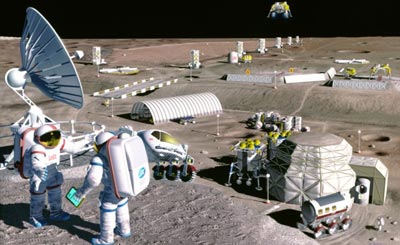|
|
 Perhaps a new word is needed to best communicate the idea of living and working beyond the Earth. (credit: NASA) |
A new word for a big idea
by Michael Huang
Monday, February 2, 2004
In 2003, Paul Geisert and Mynga Futrell introduced a new noun, bright: “a person whose worldview is naturalistic—free of supernatural and mystical elements”. The noun is designed to unite and give a positive connotation to people who do not have religious or spiritual beliefs. Bright’s outcome is yet to be determined. However, it started a discussion on the prominence and status of the non-religious community in the world.
It will be useful for a similar discussion on the political movement for humans to live beyond Earth, and a new word is a good start. To date, “space colonization” is the most common term, but it does not convey the political aspect. Politics is important, at least for government funding for space, since every dollar spent on space is one that cannot be used for other areas. Space colonization is also ambiguous since it may refer to the vacuum of space only (i.e. not planetary), or all types of colonization beyond Earth.
A new word should convey three concepts: humanity, living beyond Earth, and political philosophy:
human: anthropo- (Greek prefix)
beyond Earth: expansion
political philosophy: -ism (Greek suffix)
Anthropoexpansionism is a long word—eight syllables—but only one syllable longer than environmentalism and neoconservatism. The old word “expansionism” is associated with national movements, such as American expansionism (towards the American West) and Japanese expansionism (during World War II), but anthropoexpansionism is a movement of a species.
Unlike bright, anthropoexpansionism is a formal word. When a presidential candidate like Wesley Clark makes a sound bite: “I am pro-choice, I am pro-affirmative action, I am pro-environment, pro-health”, adding “pro-space” would suffice. In other contexts, a precise definition is useful.
Anthropoexpansionism is more suited for journals of ideas, opinions, politics and public policy, not magazines of science and technology. The hope is that an academic will do for anthropoexpansionism what Irving Kristol has done for neoconservatism: build the intellectual framework.
The goal is that anthropoexpansionism will enter the public consciousness alongside other influential political philosophies such as environmentalism, capitalism and animal rights.
Michael Huang is an undergraduate student at the University of Melbourne, Australia.
|
|
